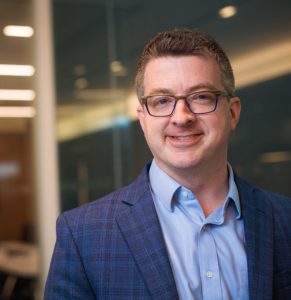Tuesday, December 7, 2021 | 10:00am-10:30am ET
Speaker: Dr. David Cox, MIT-IBM Watson AI Lab, IBM Research
Please use this link to view a recording of the What’s Next In AI seminar
Abstract: The last decade has seen exciting advances in the capabilities of AI systems, but these advances have come with the expense of ever increasing power consumption and cost as models grow larger and larger. In this session, MIT-IBM Watson AI Lab director David Cox will discuss work currently underway at IBM Research on reducing the footprint of AI models, reducing costs and allowing AI to be usefully deployed “at the edge”. He will also cover efforts to use AI to design more efficient AI models and to dynamically process less data, as well as research on entirely new computing architectures that enable low-power AI.

Speaker Bio: Dr. David Cox is the IBM Director of the MIT-IBM Watson AI Lab, a first of its kind industry-academic collaboration between IBM and MIT, focused on fundamental research in artificial intelligence. The Lab was founded with a 10 year commitment from IBM and brings together researchers at IBM with faculty at MIT to tackle hard problems at the vanguard of AI.
Prior to joining IBM, David was the John L. Loeb Associate Professor of the Natural Sciences and of Engineering and Applied Sciences at Harvard University, where he held appointments in Computer Science, the Department of Molecular and Cellular Biology and the Center for Brain Science. David’s ongoing research is primarily focused on bringing insights from neuroscience into AI research. His past work has spanned a variety of disciplines, from neuroscience experiments in living brains, to the development of machine learning and artificial intelligence methods, to applied machine learning and high performance computing methods.
David has been a speaker and agenda contributor at the World Economic Forum, and he was a Faculty Associate at the Berkman-Klein Center for Internet and Society at Harvard Law School. He has received a variety of honors, including the Richard and Susan Smith Foundation Award for Excellence in Biomedical Research, the Google Faculty Research Award in Computer Science, and the Roslyn Abramson Award for Excellence in Undergraduate Teaching. He taught and led the development of one of Harvard’s first massive open online courses (“The Fundamentals of Neuroscience”; http://fundamentalsofneuroscience.org), which has drawn over 750,000 students from around the world. His academic lab has spawned several startups across a range of industries, ranging from AI for healthcare to autonomous vehicles.
Explore
Energy-Efficient and Environmentally Sustainable Computing Systems Leveraging Three-Dimensional Integrated Circuits
Wednesday, May 14, 2025 | 12:00 - 1:00pm ET
Hybrid
Zoom & MIT Campus
Analog Compute-in-Memory Accelerators for Deep Learning
Wednesday, April 30, 2025 | 12:00 - 1:00pm ET
Hybrid
Zoom & MIT Campus
Agile Design of Domain-Specific Hardware Accelerators and Compilers
Wednesday, February 12, 2025
Hybrid
Zoom & MIT Campus




